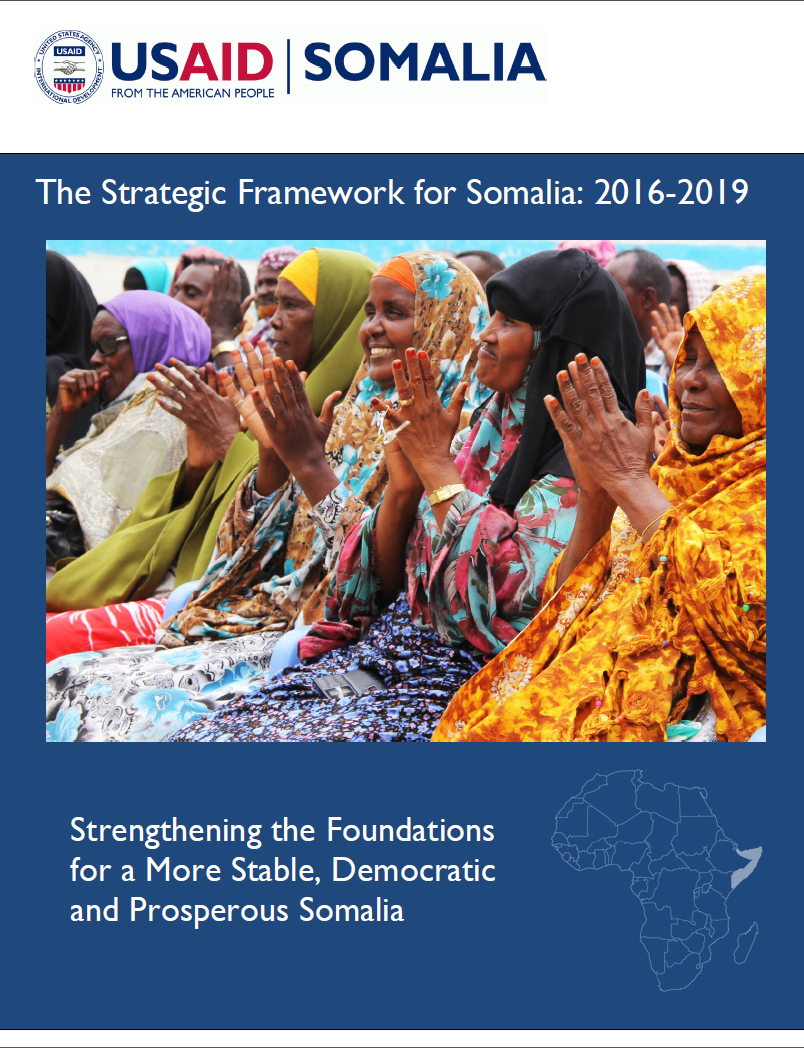Speeches Shim
2016-2019 represents a crucial period for Somalia’s transition from decades of state failure. Should Somalia harness economic, political, and social momentum to achieve greater stability, build a functional economy, improve security, and establish credible and durable governance systems, the implications for stability not only in Somalia but through the Horn of Africa will be profound. Despite the immense challenges facing the country, Somalis are forging a promising path forward, evidenced by the country’s extraordinary efforts to establish regional states, rebuild institutions, and re-engage with the international community. To capitalize on this unique window of opportunity and Somali-led effort, USAID proposes a three-year (2016 – 2019) Transitional Strategic Framework (the strategy) for Somalia that guides USAID priorities and principles of engagement to assist the people of Somalia in making progress towards their development goals.
This strategy was informed by over 100 consultations in several regions of Somalia, Kenya and the United States with an array of stakeholders, including members of the United States Government (USG), the Federal Government of Somalia (FGS), regional Somali officials, international donors, Somali leaders, academics, implementing partners, the private sector, and civil society. During these consultations, many stakeholders noted that USAID is widely perceived as a trusted partner with a broad network of relationships that has assisted USAID in successfully supporting and implementing development programs in Somalia since 2009. USAID’s development programs in Somalia have achieved notable results in building community cohesion, increasing confidence in nascent governing institutions, strengthening the capacity of key ministries, supporting elections and political processes; and providing critical social services in education and health. Despite the many challenges inherent to working in Somalia, this strategy aims to build on USAID’s past and current successes, and to contribute to USG strategic and foreign policy objectives in Somalia and East Africa and, most importantly, support a Somali-owned vision for the future as a stable, cohesive nation.
As outlined in the USG’s Integrated Country Strategy, this transition strategy contributes to the long-term desired end-state of “a unified, peaceful, and democratic Somalia with a stable and representative government able to degrade and defeat al-Shabaab; prevent terrorists and pirates from using its territory as a safe haven; provide for its own internal defense; and facilitate and foster development, growth, and political inclusion, while progressing towards long-term stability and prosperity.” The persistence of al-Shabaab remains the greatest threat to Somalia’s stability, and its development. Improving security and re-establishing rule of law are, and will remain, the most urgent priorities facing the country. Nonetheless, success in this area cannot occur without sustained investments in Somalia’s development. Security and stability in Somalia will hinge on the consolidation of accountable governance, credible political processes, transparent public sector financial management, and improvements in livelihoods—all issues that will guide USAID’s strategic focus during this crucial period.
This strategy acknowledges that myriad uncertainties make Somalia’s future difficult to predict as it emerges from decades of state failure, and takes on the complex challenge of building a cohesive federal state and fighting a still-powerful terrorist insurgency. As such, this strategy recognizes that development in Somalia will not occur along a neat continuum. Long-term development will occur alongside efforts to stabilize communities and to respond to urgent humanitarian crises. USAID may need to make strategic realignments to respond to emergent issues. Nonetheless, a developmental approach is both possible – and necessary – during this critical period in Somalia’s transition. This strategy aims to ensure, through a robust learning framework and regular strategic and programmatic reviews, that USAID remains flexible and adaptive to changing realities in Somalia, while ensuring a consistent focus on helping Somalis build a durable foundation for long-term democracy, stability, and prosperity.


Comment
Make a general inquiry or suggest an improvement.